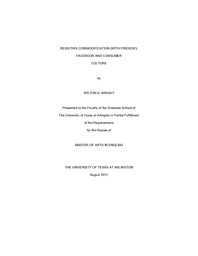
ATTENTION: The works hosted here are being migrated to a new repository that will consolidate resources, improve discoverability, and better show UTA's research impact on the global community. We will update authors as the migration progresses. Please see MavMatrix for more information.
Show simple item record
| dc.contributor.author | Wright, Wilton S. | en_US |
| dc.date.accessioned | 2011-10-11T20:49:01Z | |
| dc.date.available | 2011-10-11T20:49:01Z | |
| dc.date.issued | 2011-10-11 | |
| dc.date.submitted | January 2011 | en_US |
| dc.identifier.other | DISS-11235 | en_US |
| dc.identifier.uri | http://hdl.handle.net/10106/6187 | |
| dc.description.abstract | Is participating in the Facebook phenomenon (or can it become) politically resistant - even revolutionary? Or are social networking websites merely another form of commodified capitalist consumerism? In this thesis, I investigate the commodified/commodifying aspects of Facebook, as well as its political potential. In order to establish a common understanding of the problems created by contemporary capitalism, in the first chapter I use Guy Debord's theory of the Society of the Spectacle to provide a framework for evaluating the incessant commodification of contemporary culture. I then examine previous attempts to overturn the capitalist system and discuss possible reasons for their failure, as well as how those anti-capitalist movements of the past have influenced contemporary anti-corporate rhetoric. In the second chapter, I examine Facebook as an already commodified space. I will investigate how Facebook is being used as a tool of capitalism to propagate incomplete and misleading social and political information. I then discuss how Facebook's association with the advertising industry has allowed marketers and businesses unprecedented access to consumers' lives, and how it's very format may promote a Spectaclized vision of the self. In the final chapter I turn the tables on the previous chapter's analysis and I examine why and how Facebook can be used to fight the Spectacle of capitalist consumerism. I begin by examining what sociologist George Ritzer calls the "McDonaldization of society" and explaining how Facebook and social networking technologies can complicate and hinder this process. After examining how Facebook can help foster intelligent and honest political discussion, I conclude by describing the ways the social networking giant can help educators rethink the limits of traditional educational models and foster a more politically aware generation of students. | en_US |
| dc.description.sponsorship | Alaimo, Stacy | en_US |
| dc.language.iso | en | en_US |
| dc.publisher | English | en_US |
| dc.title | Resisting Commodification (with Friends!): Facebook And Consumer Culture | en_US |
| dc.type | M.A. | en_US |
| dc.contributor.committeeChair | Alaimo, Stacy | en_US |
| dc.degree.department | English | en_US |
| dc.degree.discipline | English | en_US |
| dc.degree.grantor | University of Texas at Arlington | en_US |
| dc.degree.level | masters | en_US |
| dc.degree.name | M.A. | en_US |
Files in this item
- Name:
- Wright_uta_2502M_11235.pdf
- Size:
- 462.6Kb
- Format:
- PDF
This item appears in the following Collection(s)
Show simple item record


